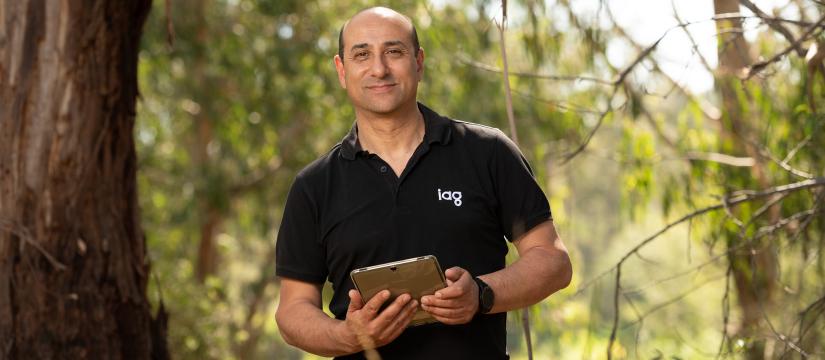
Mercy mission – IAG’s Phil Silverman
Two weeks after a bushfire had ravaged Mallacoota on December 30, 2019, roads into the devastated Victorian coastal town were still cut off. IAG Insurance assessor Phil Silverman was sitting at his desk in Melbourne, frustrated.
In disaster situations, assessors like to get in quickly to give people peace of mind. And many of Mallacoota’s stranded residents, who had lost homes and possessions, were in need of help.
So, when the opportunity arose to fly into Mallacoota aboard a military transport plane, Phil jumped in his car, drove the three hours from Melbourne to the RAAF base at East Sale, and prepared to hop aboard.
“We were briefed by air force personnel on procedure,” says Phil, a property assessing team leader with IAG, the parent company of NRMA Insurance. “The flight was an experience – it certainly wasn’t business class. Then, as we started to get close to Mallacoota you could see the devastation of it all. Even the bush around the airport was completely burnt out.”
Phil, along with fellow IAG assessor Michael Furneaux and representatives of other companies and the Insurance Council of Australia, spent the day walking the streets of Mallacoota, recording what they saw.
“We did it in a way that hasn’t been done before,” says Phil. “We walked the damaged streets and documented every property. We didn’t know who owned them or whether they were IAG customers. We just wrote everything down.
“People who are doing it tough need to know that their insurance will cover their loss. If we can get in quickly, we can put their minds at ease by saying, ‘Yes, we’re covering your claim, and we can help you get back on your feet as quickly as we can’. It’s really important when people are suffering.”
Making a difference
“In a disaster situation, we have to go and quantify what has happened,” Phil says. “We have to quantify the damage, write the job up. We write a report announcing the total loss, and what the rebuild costs will be. Most people have an insurance policy that covers them for a certain amount for building and contents, and we’re there to start the process so they can settle their claim and get their life moving again.”
When there’s a disaster, processing insurance claims often takes time because of service disruptions and the need to clear sites. “We really want to get in there as quickly as possible so people aren’t left for weeks and weeks, not knowing what’s going on,” says Phil.
When Phil and his industry colleagues arrived in Mallacoota, they walked the streets until sunset. Then they attended a community meeting to provide information to residents.
“We spoke to many of our insured to talk through next steps and reassure them that we were there to help and hear their stories,” says Phil. “This was hugely beneficial to everyone, given what they had been through, and their uncertainty about what the future held.”
After spending the night in a motel, the team hit the streets at 7am the next morning to record as much information as possible before jumping back aboard the RAAF plane at 11am. They recorded more than 100 total-loss properties. The devastation was confronting, but it was rewarding work.
“The catastrophe part of our job resonates with all assessors,” says Phil. “It gives you a feeling that you’re actually helping, whether it be in a cyclone or bushfire, to get in there to people who have done it hard and lost everything and who are worried about whether their insurance will cover their loss.
“It gives us a sense that we’re actually making a difference, and a real pride in what we do. We’re helping people get their lives back. Some of them have nothing but the clothes on their back and they need to know their insurance policy is there to help them.”
When it comes to advice, Phil is clear: “Make sure you have enough cover on your policy, and make sure you have a fire plan, so you can get out and not risk your life. Your safety is way more important than bricks and mortar.”


